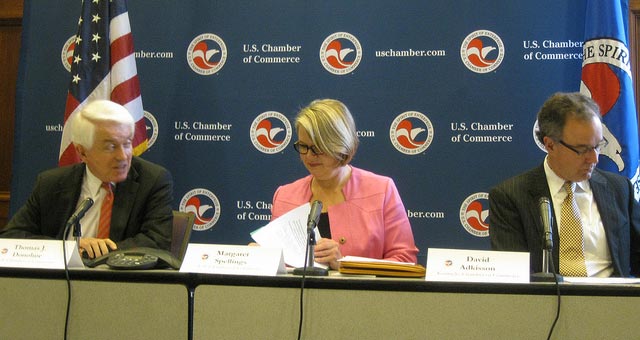
On July 12, the Senate Judiciary Committee approved a 28th Amendment that would overturn Citizens United v. Federal Election Commission and once again allow the states and Congress to enact fair election spending rules. The amendment protects the freedom of speech of all, as well as the integrity of elections and the time-honored principle of one American, one vote.
But the vote gave Washington-insiders like the US Chamber of Commerce a serious case of dyspepsia. A statement from the Chamber’s president, Thomas Donohue, accused Congress of “play[ing] political games with our Constitutional protections.” Donahue is dead wrong.
With a similar measure in the House, Congress is not playing games; they are finally recognizing the widespread demand from Americans of diverse political viewpoints across the country who worked to win 28th Amendment resolutions in more than 600 cities and towns and 16 states so far. Montana’s 28th Amendment ballot initiative in 2012 was typical: The same voters who preferred Mitt Romney to Barack Obama by 54 percent to 45 percent approved the 28th Amendment resolution to overturn Citizens United by 75 percent to 25 percent. And according to a late-July poll, 73 percent of Americans continue to favor such an amendment, with overwhelming cross-partisan support in every region in the country.
The Chamber claims the 28th amendment runs counter to the original intent of the “founding fathers.” Wrong again.
As the now-retired Justice John Paul Stevens wrote in dissenting from the Citizens United decision:
The Framers took it as a given that corporations could be comprehensively regulated in the service of the public welfare. [T]hey had little trouble distinguishing corporations from human beings, and when they constitutionalized the right to free speech in the First Amendment, it was the free speech of individual Americans that they had in mind.
The Chamber’s view of our Constitution could not be further from our founding principles. The framers of our Constitution sought to prevent dangerous concentrations of power that would eliminate the voices and influence of the people. The Chamber specializes in funneling huge amounts of secret money from a few global corporations to control election and policy outcomes.
The US Chamber spent more than $35 million in the 2012 election, and more than $1 billion in lobbying activity since 1998. It is not letting up now, deploying millions more to attack independent Republicans and conservatives. The goal, according to the Chamber’s president: “A more governable Republican party.” Donohue even brags about the Chamber’s power to control politicians, claiming that when the Chamber “bites you on the butt, you bleed.”
The Chamber’s biting may serve the largest global corporations, but it badly disserves American interests and people.
The US Chamber of Commerce has special reason to fear the determination of Americans to win back honest and effective government. The 28th Amendment would not only end their billion dollar pay-to-play politics; it would undo the Chamber’s long-term project to fabricate special rights and power for corporations and big money just as it achieved its biggest success with Citizens United.
The legal precedent for Citizens United, in large part, came from corporate lawyer and US Chamber of Commerce advisor Lewis Powell, who served as a Supreme Court justice from 1972 to 1986. Before his judicial nomination process, Powell had outlined a secret memorandum to the Chamber, calling on the group to organize the largest corporations to gain “political power available only through united action,” and to deploy “the scale of financing available only through joint effort.” The 1971 Powell Memo, as the Chamber called it, described a key long-term opportunity: “[E]specially with an activist-minded Supreme Court, the judiciary may be the most important instrument for social, economic and political change.”
Once on the Supreme Court, Powell wrote four key decisions in the space of eight years that created the “corporate speech” doctrine and led straight to Citizens United and its disastrous erosion of the representation of most Americans in the political process.
The gathering momentum for the 28th Amendment demonstrates that Americans are fed up with the Chamber’s billion-dollar pay-to-play politics. When the 28th Amendment clears the hurdle of approval by two-thirds of Congress and three-fourths of the states, all Americans again will enjoy freedom of speech and the responsibilities of self-government. When we can vote for and be represented by candidates who are accountable, as the founders expected, to “the people themselves,” rather than to the Chamber’s corporate dollars, it is not Republicans or Democrats, conservatives or liberals, who will “win.” The winners will be all Americans and our continued quest for a democracy for all.
A terrifying moment. We appeal for your support.
In the last weeks, we have witnessed an authoritarian assault on communities in Minnesota and across the nation.
The need for truthful, grassroots reporting is urgent at this cataclysmic historical moment. Yet, Trump-aligned billionaires and other allies have taken over many legacy media outlets — the culmination of a decades-long campaign to place control of the narrative into the hands of the political right.
We refuse to let Trump’s blatant propaganda machine go unchecked. Untethered to corporate ownership or advertisers, Truthout remains fearless in our reporting and our determination to use journalism as a tool for justice.
But we need your help just to fund our basic expenses. Over 80 percent of Truthout’s funding comes from small individual donations from our community of readers, and over a third of our total budget is supported by recurring monthly donors.
Truthout has launched a fundraiser to add 500 new monthly donors in the next 10 days. Whether you can make a small monthly donation or a larger one-time gift, Truthout only works with your support.